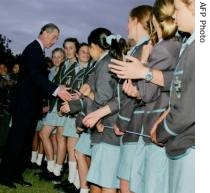2007年VOA标准英语-Asian Language Crisis Grips Australia
时间:2019-02-02 作者:英语课 分类:2007年VOA标准英语(八月)
By Phil Mercer
Sydney
16 August 2007
Australia's foreign language skills are declining. New figures show that only 13 percent of high school graduates can speak a foreign language - compared with more than 40 percent in the 1960s. Academics worry that this means Australia will increasingly be isolated 1 from its economically important Asian neighbors. From Sydney, Phil Mercer reports.

Britain's Prince Charles, left, greets students from Geelong Grammar where he attended school in 1966 as a 17-year-old student (file photo)
The last census 2 found that almost 400 different languages are spoken in homes across Australia, where a quarter of the population was born overseas.
In the 1980s the government gave special attention to teaching Asian languages in schools and universities as Canberra sought closer ties with its regional neighbors.
But increasingly it appears that commitment has waned 3, and Australia is less able to deal with its neighbors.
Figures show that only 13 percent of Australian high school graduates know a foreign language, less than half of those are proficient 4 in an Asian language. Four decades ago, 40 percent had foreign language skills.
Research by Australian universities has shown that a monolingual country often performs worse in international trade and diplomacy 5.
Professor Elise Tipton from Sydney University says increasingly students do not feel the need to learn another language to boost their careers.
She believes that Australia's economic boom, which is driven by red-hot demand for its minerals, is helping 6 mask serious deficiencies in its language skills.
"Even with the rise of China then I think there's something about Australia being a resource supplier. China comes to us. We don't really have to beat down the doors and learn their culture and language in order to get business," said Tipton. "Americans, if they want to do well in China, would have to work a little bit harder in terms of learning language and culture than Australians."
Australia does business very successfully in English with most of its trading partners.
But as the world's economic power shifts to emerging regions such as Asia, Australia's language gap could soon be exposed.
Dilip Dutta from the faculty 7 of economics and business at Sydney University says that language skills can enhance trading opportunities.
"If you want to get trade with Asian countries it's very important that [they] learn the language which will help them to get closer to the culture, which will be easier to come up with some kind of trade negotiation 8 or trade enhancement through close connections using their own language," said Dutta.
Pippa McCowage, a 22-year-old economics student, says many young Australians have a half-hearted approach to foreign languages, and that the language curriculum often is weak.
"While it is encouraged in high school to learn another language, it's not really seen to me as a realistic expectation that you will have to speak it," said McCowage. "For example, I learned Japanese in high school, went on an exchange in Year 10, so when I was 16, and found that the Japanese students of my age had a much greater proficiency 9 in English than I did in Japanese. So in that sense it almost discourages you."
Classmate Rob Tyson blames Australia's geographical 10 isolation 11 for declining interest in foreign languages.
"There's a big difference between speaking it in class and having conversations with other people learning and then being able to spend a lot of time in a country where I have the ability to practice that conversationally," he said. "So it's not the same as being in Europe where you could pop across to France or you've got that inter-action or in some of the Asian regions where there is such a difference in dialect."
About 70 percent of Australia's major exports go to Asia and the government of Prime Minister John Howard has been keen to develop closer economic, diplomatic and security ties with Asia.
Academics say that as Asia becomes one of the world's economic powerhouses, Australia needs to improve its language skills if it is to take full advantage of the business opportunities on its doorstep.
- His bad behaviour was just an isolated incident. 他的不良行为只是个别事件。
- Patients with the disease should be isolated. 这种病的患者应予以隔离。
- A census of population is taken every ten years.人口普查每10年进行一次。
- The census is taken one time every four years in our country.我国每四年一次人口普查。
- However,my enthusiasm waned.The time I spent at exercises gradually diminished. 然而,我的热情减退了。我在做操上花的时间逐渐减少了。 来自《用法词典》
- The bicycle craze has waned. 自行车热已冷下去了。 来自《现代汉英综合大词典》
- She is proficient at swimming.她精通游泳。
- I think I'm quite proficient in both written and spoken English.我认为我在英语读写方面相当熟练。
- The talks have now gone into a stage of quiet diplomacy.会谈现在已经进入了“温和外交”阶段。
- This was done through the skill in diplomacy. 这是通过外交手腕才做到的。
- The poor children regularly pony up for a second helping of my hamburger. 那些可怜的孩子们总是要求我把我的汉堡包再给他们一份。
- By doing this, they may at times be helping to restore competition. 这样一来, 他在某些时候,有助于竞争的加强。
- He has a great faculty for learning foreign languages.他有学习外语的天赋。
- He has the faculty of saying the right thing at the right time.他有在恰当的时候说恰当的话的才智。
- They closed the deal in sugar after a week of negotiation.经过一星期的谈判,他们的食糖生意成交了。
- The negotiation dragged on until July.谈判一直拖到7月份。
- He plied his trade and gained proficiency in it.他勤习手艺,技术渐渐达到了十分娴熟的地步。
- How do you think of your proficiency in written and spoken English?你认为你的书面英语和口语熟练程度如何?
- The current survey will have a wider geographical spread.当前的调查将在更广泛的地域范围內进行。
- These birds have a wide geographical distribution.这些鸟的地理分布很广。